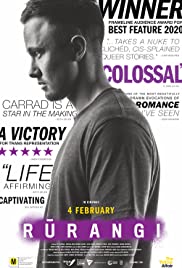
RURANGI
New Zealand, 2020, 87 minutes, Colour.
Elz Carrad, Arlo Green, Awfina- Rose Ashby, Kirk Torrence.
Directed by Max Currie.
Rurangi is a country town on the North Island of New Zealand. It is presented as a typical town, homes, shops and stores, farms.
However, the film focuses on Caz (Elz Carrad), initially seen driving, reflection in the rear vision mirror, driving towards Ruranti, turning around but crashing at the sign of the town. He has to remain in the town for his car to be repaired.
However, it is revealed that he comes from the town, had left 10 years earlier, missed his mother’s funeral, was returning to meet his father. There are some flashback memories which indicate his background to the audience – growing up as a girl in the town, finding it stifling, leaving, going to Auckland, meeting up with the LGBTIQ community, transgender changes, hormones, living as a man, campaigning, speeches and protests.
Which means that the main thrust of the film is his meeting up with friends, especially the Maori Anahera who works at the shop, is taunted by some of the locals that she can’t speak the Maori language, who is trying to learn more, even going to evening school in the town. Caz also meets Jem, who works in the store, also works with Caz’s father, memories of their relationship in the past, their plans for the future, germs upset with Caz’s disappearance.
And Caz visits his father, still grieving about the death of his wife, not recognising his daughter in the man before him, taking him to his mother’s grave, gradually getting to know him, especially after Kaz goes to repair his drainpipe and the father collapses, going to hospital.
There is also a social concern theme throughout the film, the father putting a plan to the local Council to limit phosphates which have been destructive on the farms. There is some discussion about the issue with the other farmers and some difficulties with a rather haughty chair of the Council. Eventually, this is the occasion where Caz can be honest with the town, his father unable to present his petition in person but the rules allowing for to do this – and Caz steps forward.
A sympathetic presentation of a transgender person (as is Elz Carrad) as well as a dramatising of country town reactions, some disbelief, some dismay, some growing in understanding.
1. Title? The New Zealand town? Isolated? The people of the town? Environmental concerns, the council? Shops? Farming?
2. The visuals of the town, the sign, the road, the streets, shops and businesses, interiors? Town council? Homes, farms? The musical score?
3. Flashbacks to Auckland, the city, LBGTQ campaigns, meetings, socials?
4. Caz, seen in the rear vision mirror, the focus on his face, the male face, stubble? Caz as trans-gender? His past, images of his childhood as Gerald’s daughter, his mother and the dresses? The story of his growing up, tomboy? The relationship with Jem? A future? His feeling of oppression, leaving town, disappearing for 10 years, missing his mother’s funeral? His campaigning and activism with the community? Speeches and rallies? Demonstrations? Friends?
5. Turning the car around, the crash at the sign, going back home? Going to the shop, Anahera, not recognising him, her reactions, on his leaving, on his return, embrace, accommodation? His staying with her?
6. Caz and his phone call to his father, his father hanging up? Going to the meeting with Anahera, the issues, his father, his father’s speech? Jem and his watching him, puzzled?
7. Jem, his work in the shop, living in the caravan, working with Gerald? At the pub, going over to talk to Caz, the revelation, his reaction? The later meetings and discussion, the kiss? Jem and his bewilderment, past feelings and relationship, hopes, Caz’s disappearance?
8. Anahera, the criticism of the shopper, her married background, not able to speak the language, the scenes of her quoting language? Going to the school, teacher and the welcome, seeing the objecting woman, leaving?
9. Gerald, the tradition of farmers, his speech proposal to the Council, the reaction, the issue of phosphates, the responses of the farmers at the meeting? The encounter with Caz, giving him a lift, his angers, taking him to his mother’s grave? Gradually talking, some kind of reconciliation? Caz fixing the drainage, Gerald and his turn, hospital?
10. Caz deciding to leave, to Auckland, his speech and his breakdown? Discussions with Anahera, a farewell to Jem, the invitation to go to the council meeting, the Council President not allowing Anahera to present Gerald’s petition, Caz identifying himself, his putting forward his father’s proposal?
11. Audience empathy with Caz, with the characters, the situations, issues of transgender, for the person concerned, for relatives and friends, for community? A film breaking down barriers?